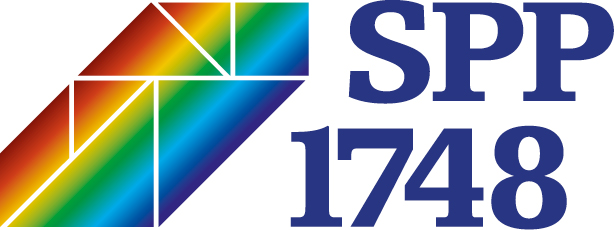Program
Timeline for Monday, April 15th
The presentations take place in the Humboldt-Kabinett (RUD 25).
| 09:15 | Opening | |
| 09:30 | S. Sauter | Finite Elements for
Elliptic Eigenvalue Problems in the Preasymptotic
Regime |
| 10:30 | J. Gedicke | Benchmark Computation of Eigenvalues with Large Defect for Non-Selfadjoint Elliptic Differential Operators |
| 11:00 | Coffee break | |
| 11:30 | D. Peterseim | Sobolev gradient flow for the Gross-Pitaevskii eigenvalue problem: global convergence and computational efficiency |
| 12:30 | Lunch break | |
| 14:15 | T. Vejchodsky | Fully computable error
bounds for eigenfunctions |
| 15:15 | M. Vohralik | Guaranteed a posteriori bounds for eigenvalues and eigenvectors: multiplicities and clusters |
| 16:15 | Coffee break | |
| 16:45 | J. Storn | Computation of the LBB constant with a least-squares finite element method |
| 17:15 | R. Ma | Guaranteed lower bounds for eigenvalues of elliptic operators in any dimension |
| 17:30 | D. Boffi (TBC) F. Bertrand |
A posteriori error analysis for the mixed Laplace eigenvalue problem |
| 18:15 | Closing | |
| 19:15 | Dinner in Berlin Mitte | |
Timeline for Tuesday, April 16th
| There will be informal discussions and individual appointments from 9:15 to 17:15 in Adlershof. |
Abstracts
| Speaker: | S. Sauter |
|---|---|
| Title: | Finite Elements for Elliptic Eigenvalue Problems in the Preasymptotic Regime |
|
Convergence rates for finite element discretisations of
elliptic eigenvalue problems in the literature usually
are of the form: If the mesh width h is fine enough
then the eigenvalues resp. eigenfunctions converge at
some well-defined rate. In our talk, we will analyse
the maximal mesh width h0 - more precisely the minimal
dimension of a finite element space - so that the
asymptotic convergence estimates hold for h<h0. This
mesh width will depend on the size and spacing of the
exact eigenvalues, the spatial dimension and the local
polynomial degree of the finite element space. We will
show the results of some numerical experiments
concerning a) the convergence of the eigenfunctions and
- values, b) the convergence of the eigenvalue
multigrid method to investigate the sharpness of the
theoretical results.
This talk comprises joint work with L. Banjai and S. Börm. | |
| Speaker: | J. Gedicke |
| Title: | Benchmark Computation of Eigenvalues with Large Defect for Non-Selfadjoint Elliptic Differential Operators |
|
In this talk we present benchmark problems for
non-selfadjoint elliptic eigenvalue problems with large
defect and ascent. We describe the derivation of the
benchmark problem with a discontinuous coefficient and
mixed boundary conditions. Numerical experiments are
performed to investigate the convergence of a Galerkin
finite element method with respect to the
discretization parameters, the regularity of the
problem, and the ascent of the eigenvalue. This allows
us to verify the sharpness of the theoretical estimates
from the literature with respect to these parameters.
We provide numerical evidence about the size of the
ascent and show that it is important to consider the
mean value for the eigenvalue approximation.
| |
| Speaker: | D. Peterseim |
| Title: | Sobolev gradient flow for the Gross-Pitaevskii eigenvalue problem: global convergence and computational efficiency |
| Reference: | arxiv.org/abs/1812.00835 |
|
We propose a new normalized Sobolev gradient flow for
the Gross-Pitaevskii (nonlinear Schrödinger) eigenvalue
problem based on an energy inner product that depends
on time through the density of the flow itself. The
gradient flow is well-defined and converges
exponentially fast to an eigenfunction. Its forward
Euler time discretization yields a numerical method
which generalizes the inverse iteration for the
nonlinear eigenvalue problem. For sufficiently small
time steps, the method reduces the energy in every step
and converges globally to an eigenfunction. In
particular, for any nonnegative starting value, the
ground state is obtained. A series of numerical
experiments demonstrates the computational efficiency
of the method and its competitiveness with established
discretizations arising from other gradient flows for
this problem.
This is joint work with Patrick Henning (KTH Stockholm). | |
| Speaker: | T. Vejchodsky |
| Title: | Fully computable error bounds for eigenfunctions |
|
For the Laplace eigenvalue problem we use two-sided a
posteriori error bounds on eigenvalues and derive fully
computable error bounds for eigenfunctions. Estimation
of eigenfunctions is a delicate problem, because
individual eigenfunctions do not depend continuously on
problem data, in general. Eigenfunctions corresponding
to tight clusters of eigenvalues are sensitive to small
perturbations of the problem and eigenfunctions
corresponding to multiple eigenvalues exhibit even a
discontinuous behaviour.
To overcome this problem, we consider spaces of eigenfunctions corresponding to clusters of eigenvalues. We derive a guaranteed bound on the directed distance between the exact and approximate space of eigenfunctions. In the case of simple eigenvalues it simplifies to the bound from [G. Birkhoff, C. De Boor, B. Swartz, B. Wendroff, SIAM J. Numer. Anal. 3 (1966), 188-203] and it can be used to estimate the usual energy norm of the difference between the exact and approximate eigenfunction. This is joint work with Xuefeng Liu. | |
| Speaker: | M. Vohralik |
| Title: | Guaranteed a posteriori bounds for eigenvalues and eigenvectors: multiplicities and clusters |
|
We present a posteriori error estimates for conforming
numerical approximations of eigenvalue clusters of
second-order self-adjoint elliptic linear operators
with compact resolvent. Given a cluster of eigenvalues,
we estimate the error in the sum of the eigenvalues, as
well as the error in the eigenvectors given through the
density matrix, i.e., the orthogonal projector on the
associated eigenspace. This allows us to deal with
degenerate (multiple) eigenvalues within the framework.
All the bounds are valid under the only assumption that
the cluster is separated from the surrounding smaller
and larger eigenvalues; we show how this assumption can
be numerically checked. Our bounds are guaranteed and
converge with the same speed as the exact errors. They
can be turned into fully computable bounds as soon as
an estimate on the dual norm of the residual is
available, which is presented in two particular cases:
the Laplace eigenvalue problem discretized with
conforming finite elements, and a Schroedinger operator
with periodic boundary conditions of the form -Laplace
+ V discretized with planewaves. For these two cases,
numerical illustrations are provided on a set of test
problems.
| |
| Speaker: | J. Storn |
| Title: | Computation of the LBB constant with a least-squares finite element method |
|
An investigation of a least-squares finite element method (LSFEM) for the Stokes problem reveals a relation of the Ladyzhenskaya-Babuška-Brezzi (LBB) constant and the ellipticity constants of the LSFEM. While the approximation of the LBB constant with standard numerical methods is very challenging, the approximation of the ellipticity constants is in a Rayleigh-Ritz-like environment. This setting is well-understood and so leads to an easy to implement convergent numerical scheme for the computation of the LBB constant.
| |
| Speaker: | R. Ma |
| Title: | Guaranteed lower bounds for eigenvalues of elliptic operators in any dimension |
|
In this talk, we introduce a novel generalized Crouzeix–Raviart element. This new element can produce asymptotic lower bounds for eigenvalues of general second order elliptic operators, and guaranteed lower bounds by a simple post-processing method.
| |
| Speaker: | D. Boffi (TBC) |
| Title: | A posteriori error analysis for the mixed Laplace eigenvalue problem |
|
This talk considers the homogenous Laplace eigenvalue
problem on polygonal domains and in mixed formulation.
The problem is discretized using Raviart-Thomas finite
elements of arbitrary polynomial degree on adaptive
meshes. Using the Prager-Synge hypercircle approach
with local flux reconstructions, a fully computable
upper bound for the flux error in the L2-norm is
derived, provided that the eigenvalue is simple.
Efficiency of the local error estimators is proven and
numerical experiments where convergence rates are
studied will be provided.
This is joint work with Fleurianne Bertrand and Rolf Stenberg. | |



